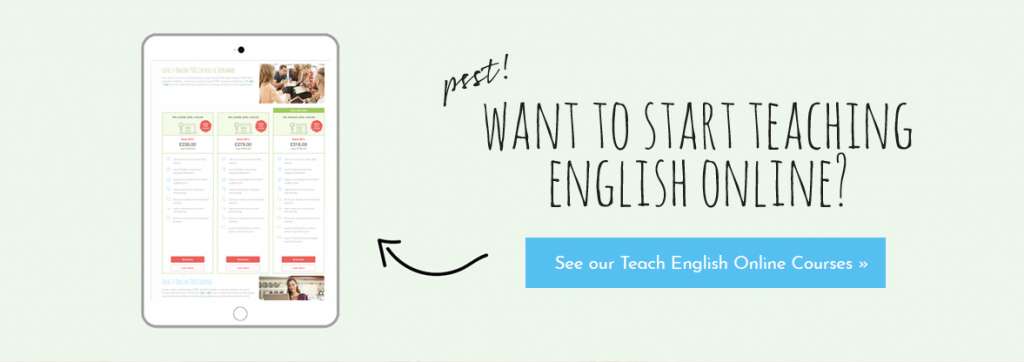Expert TEFL teacher, Audrey (@travelrichmoneypoor) went live on i-to-i’s Facebook page to host a Q&A session about teaching English online and abroad. Watch a recording of the full webinar here or read on for edited extracts.
Why did you become a TEFL teacher?
I came to Italy when I was 21 to work as an au pair. I fell in love with Italy and I really loved teaching English to my host’s children. What was even more amazing is that they were teaching me Italian. I realised how many opportunities I had from learning a second language. That is the reason I became a TEFL teacher – because I wanted to give someone else the opportunities that learning a second language gave to me.
I got my TEFL certificate with i-to-i TEFL and, when I was qualified, I started teaching at the kindergarten in a bilingual school in Milan. It was great but then Covid hit Italy in February 2020. Everything closed down in a day and we transferred online. My hours started going down as kindergarten learners can’t spend eight hours a day online, so I transferred into teaching English online.
Should I teach English abroad?
TEFL teaching abroad is a great experience if you are a person who loves travelling and wants an adventure. The cool thing about teaching abroad is that you are immersed in a different culture. I was able to learn Italian. I was able to learn about the Italian holidays and traditions and eat Italian food.
I really wanted to go and explore. In America, you can travel to different states. Here in Europe, you travel and you are in a different country with a different language and a different culture. I worked from 8am on Mondays until 5pm on Fridays. I would take the 5am flight on Saturday to whatever country I was going to and take the 5am flight home on Monday and get on the bus and go straight to school. It was a bit of a crazy situation.
What qualifications do you need to teach English abroad?
To teach English abroad, you usually need a TEFL certificate but each country has different requirements. Here, in Italy, I can’t work at a public school because I was not qualified through the Italian education system but I can teach in private schools. Some countries want a degree and some employers will want you to have a Level 5 over a Level 3 TEFL certificate. I don’t have a degree but, once I’d got my TEFL certificate, I had a lot of job offers.
The visa process is different for each country and also depends on where you are from. For example, in Italy, I started off with a student visa. I was going to Italian school and, while I was at Italian school, I was teaching. Canadians and Australians are allowed to come over to Italy and have a working holiday visa but for Americans, that is not a thing.
How can I find a TEFL job abroad?
i-to-i TEFL’s sister website LoveTEFL Jobs is amazing. They put up a bunch of jobs and internships. It might be a little tricky to find an in-person job right now but it is definitely possible. You need to put yourself out there. Send emails to schools. Send emails to agencies. Sign up to LoveTEFL Jobs. The only people that I have seen that are not as successful as they should be are the people who have not given it their all. Give it your all and you will be successful.
When I started looking for schools in Milan, I went on Google and searched for language schools in Milan. I emailed each one personally and quite a few invited me for an interview.
The biggest challenge of teaching English abroad is that a lot of companies want you to be in their country so that they can interview you in person (although, of course, they are doing online interviews now). You could take a vacation there first, interview with schools and then, once you get accepted, move there. There also are companies that let you apply online from your home country.
How can I find my first TEFL job when I don’t have teaching experience?
Research the company you’re applying to, so you can tailor your application to the things that they care about. If you have no TEFL experience to put on your CV, think about if you’ve had any experience with children, maybe as a camp counsellor, soccer coach or babysitter? Did you ever have a job where you taught someone something, perhaps as a manager or assistant manager? Use that to your advantage.
My CV had babysitter, camp counsellor, au pair, manager of hair salon and teacher’s aid. If you don’t have TEFL experience, think about what you have done in life. It might not be teaching English but if you taught your colleagues how to do something within your job, that is still teaching.
I want to TEFL abroad but I’m terrified of leaving my comfort zone – should I go?
TEFL abroad can be scary when you start. I planned to be in Italy for a year. I did three months as an au pair and then a year in language schools. I decided that I loved it so I stayed here and then Covid hit. I haven’t seen my family in two years but I absolutely love this experience.
The TEFL certificate has given me endless opportunities. I am teaching online. I have worked abroad. I have created my own prop packet. I now coach teachers to help them get onto platforms. I do things with i-to-i. There are endless opportunities with the TEFL certificate.
You will only ever regret the decisions you didn’t take. If you decide teaching abroad is not for you, you can move back home and teach online. It is not a wasted certificate.
Did you ever have a moment when you thought that you couldn’t do this?
With any career, you are always going to have self-doubt at some point. You can’t let that self-doubt ruin the rest of your day or the rest of your career. You have to decide that you didn’t nail it in that moment, so how can you go about it differently next time.
Sometimes with little kids, they don’t understand English when it’s not their first language or they just can’t express themselves in the way that they would if they could say it in their own language. There is always going to be that moment. You just have to work through that with them.
How did you start teaching English online?
I worked in the kindergarten of a language school. I had heard about teaching online but I didn’t think it was a possibility. It seemed like one of those jobs that is not real. When Covid hit, I went onto my Instagram page and reached out my friends. They said, ‘Have you ever thought about PalFish?’ The funny thing is, I had actually started my application but I was waiting for the moment to make the jump. Just like all of you, I was scared in the beginning.
It took me a week to get through the whole application. You give basic information, then you do an interview (which is like a mock class) and then you do a little quiz. Now, they have added a part where you have to do lesson preparation. I started online because of Covid and now I absolutely love it.
What qualifications do you need to teach online?
For PalFish, I had to have a TEFL certificate and I had to be from the UK, Ireland, America, Canada, New Zealand or Australia. I did not need to have a degree. Once I passed the interviews, I was good to go.
There are so many online TEFL companies out there, not just for China or Asia, but for Europe, for Russia, all over the world. Each company has different requirements. Some companies want you to have a degree or to work a set schedule or a set number of hours each week. You will get a job. You just might need some time to dig through all the companies and find the one which is right for you.
Which online TEFL companies employ South Africans?
Companies like Preply, iTalki, Magic Ears and Cambly hire South Africans and non-native English speakers. i-to-i has written a blog article all about the best online employers for South Africans.
One thing I did here in Italy before lockdown was private tutoring, which can be cool if you are not a native English speaker. You can teach people who need more communication in your own native language until they grasp the amount of English they need to move forward.
Whether you are a native English speaker, whether you are a non-native English speaker, whether you are abroad or online, there is a job for you. There are endless opportunities. I am coaching teachers. I am doing prop packets. I am partnering with i-to-i TEFL. There are a million things you can do with a TEFL certificate.
What are the benefits and challenges of teaching online?
There are loads of benefits of teaching online. One, you don’t have to commute. For my old school, I had to commute an hour and a half each way. That was three hours each day. Now, I walk three seconds into the other room and I am teaching. Another benefit is that I work from home. I don’t have to leave the house. My work has not been affected by lockdowns in Covid.
Teaching online also gives me a flexible schedule. I get to pick the days and times that I work. When I first started on PalFish, I really wanted to prove myself to the company. I was working 45 hours a week, I started at midnight and worked until 4pm. You don’t have to do that. Now I work around 25 to 30 hours a week. It is flexible. If I want to work a ton, I can work a ton. If I don’t want to work a ton, I close my schedule and I don’t have students.
Another good thing about online TEFL is that you can teach English online from anywhere in the world. If you have a good internet connection, then you are good to go. When Covid is over, I could pick up my iPad and fly to America to see my friends and family and still teach. I don’t have to worry about taking a month off and losing my job.
The biggest challenge for teaching online is the time zone. Teaching online is very easy to get started in but you might have to do midnight to 3am, depending on your time zone.
Where can you find online TEFL jobs?
LoveTEFL Jobs has online teaching jobs advertised. I work for PalFish. I have friends who work for Cambly and for VIPKid. I have been at PalFish since March 2020. I have taken about a month off, broken down into holidays. I have just hit 1,150 hours. I have very good student retention. I have over 40 regular students that I see multiple times a week.
If you live abroad, you can post in a Facebook group – most cities have a Facebook group now. I said, ‘Hi, my name is Audrey. I am a teacher in a bilingual school in Milan and I would love to do some tutoring on the side. If anyone is interested, here is my information.’ It went from zero to 13 people in two days.
Is there still a strong demand for online TEFL teachers?
There is always a demand for online TEFL teachers, just as there is for in-school teachers. Think about how many people there are in the world and then think about how many countries do not have English as their native language. There are always new children being born and there are people later in life who decide they want to take up a second language.
Some people start an online teaching job and, after a year, decide they want to go back into school. That is a new job opening. If you want to find an online TEFL job it is more than available than you. It is your hard work and determination that you will get you there.
Should I use props in my online TEFL interview?
Yes – props are my life. I use real fruit, pens and pencils. I have stuffed animals, paper props, flash cards, number cards, hats. I have a headband that has two little balls on it that I will use to teach my kids about ears. Props are a huge thing. i-to-i has a resource pack that I created which is all about props. I also did a video that is included in the courses, where I explain how to use them.
To prepare for your interview, I recommend searching Google or YouTube for interviews with your company to see how their successful teachers speak and act.
Is your salary affected by the number of hours you work?
In online TEFL jobs, your pay depends on how much you work. It is not salary based. I am paid for each 30-minute class I teach. If I work less, I will make less. At my highest point, I made $3,728 in one month, teaching 330 classes on PalFish. I was also named one of the top 10 teachers and one of the top sellers, so I did have two bonuses included in that.
I now work a more normal schedule and take days off. When the students were in lockdown, I was making $3,200. Now the students are back at school, I make around $2,500 to $2,700 per month.
How much should you charge for private TEFL tutoring?
How much you should charge for private TEFL classes varies. Some people in Milan charge 40 Euros an hour and get one student. I had 13 students at 15 Euros an hour. Is one student at 40 Euros going to top 13 students at 15 Euros? I chose to drop my prices a little bit but it depends on where you live. Always charge for your work though.
Do any TEFL jobs offer healthcare and pension plans?
A bilingual school might offer healthcare, pension and those extras. If you are teaching online, you are going to have to do that yourself. I do my pension plan individually and I have free healthcare in Italy. My in-person school paid my taxes but, for my online school, I pay my own taxes.
Is there an age limit on teaching English online?
There is no age limit on teaching English online. One of the highest ranked teachers on PalFish, with the most hours, is in her late 50s / early 60s. There is no rule against how old you are. If you are a good teacher, that is all that matters.
Is it better to have a laptop or an iPad to teach online?
I can use an iPad with my company but many teaching companies are stricter. If you have to choose between the two, I would probably go for a laptop because it will give you more companies to choose from.
Will I need to do my own TEFL lesson plans?
So many people ask me this. I used to lesson plan because I worked in a school and I also had lesson plans for my tutor lessons. You will find what works for students and what does not work for your students. If you need help, i-to-i has great lesson planning resources.
My favourite thing about PalFish is that I do not have to lesson plan. PalFish supplies their own lesson plans and I just have to teach. If you don’t have to spend your energy on lesson plans, focus on marketing or researching props. Switch your free time from not having to lesson plan into another way of bettering yourself as a teacher.
In summary…
The biggest thing about teaching online or teaching in person is your determination to do it. Some people get worried that they are not going to succeed and that is what is stopping them. No matter what, you can succeed in one way or another with TEFL teaching, whether that is in person or online. Do not give up on yourself. Just because one company says no to you, does not mean that all the companies will say no to you. Keep on trying.
You need to really dive into it. Do your research before you graduate. Start finding out about companies, create props, watch TPR videos, look at lesson plans. Enjoy the whole process. It is all going to make it possible for you to be awesome teachers. TEFL is something I am really passionate about. It is something you can take anywhere in the world. As corny as it sounds, TEFL actually can change your life.
FIND OUT MORE
Listen to the full webinar
Download our FREE teaching online guide
Book your TEFL course




